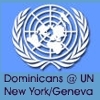

| BRIEFING - June 22 , 2011 | To learn more about the Millenium Development Goals, click on the graphic Past Briefings: June 8, 2011 May 11, 2011 April 27, 2011 April 6, 2011 March 23, 2011 March 9, 2011 February 9, 2011 January 26, 2011 January 12, 2011 |
||
Pray for peaceful independence day for Southern Sudan
Having recently returned from Kenya, and the meeting of Dominican Sisters of Africa, I can’t help but pay greater attention to the plight of that beautiful continent—in particular, the ongoing violence in Sudan. Sudan is the largest country in Africa and the Arab world. After gaining independence from Egypt and the United Kingdom in 1956, the country experienced 17 years of civil war, from 1955 to 1972. This was followed by ethnic, religious and economic conflicts between Northern Sudan, whose roots are mainly Nubian and Arab, and Southern Sudan, which is predominantly Christian and animist. These conflicts led to a second wave of civil war, beginning in 1983. Due to the extreme political instability of the region, Sudan then fell prey to a bloodless coup d’etat by Colonel Omar al-Bashir, who became the self-proclaimed president of Sudan in 1989. The Comprehensive Peace Agreement of 2005, which ended two decades of civil war which left more than 2 million people dead, while another 4 million were displaced from their homes, also recognized the South as a semi-autonomous region with the right to hold a vote of self-determination. This vote took place in a referendum held on Jan. 9 of this year, in which the people of Southern Sudan voted overwhelmingly to secede from the North. On July 9, Southern Sudan will become the world’s newest nation, and be officially recognized as an independent state. There was to have been a separate referendum to determine the future of Abyei, a disputed area on the border between the North and the South. However, due to a question regarding voter eligibility, the referendum was not held. While most residents of Abyei belong to the Ngok Dinka ethnic group and align themselves with the South, Abyei’s fertile grazing grounds are used seasonally by an Arab nomadic group with allegiance to the North. What compounds the situation is the fact that Abyei is located near major oil fields, which both the North and the South claim as their own. Last month, troops from Northern Sudan moved into the region, sending tens of thousands of people who are aligned with the South fleeing for their lives, resulting in a major humanitarian emergency along the border. Just this week, however, leaders from the North and the South signed an agreement to demilitarize the region, and allow an Ethiopian peacekeeping force to monitor the situation. Thabo Mbeki, former president of South Africa, has been instrumental in bringing both sides to the table. The concern now is the violence in Sudan’s oil-producing state of Southern Kordofan. Clashes between Sudanese government troops, the Sudan Armed Forces (SAF), and members of the former southern rebel group, the Sudanese People’s Liberation Army (SPLA), have displaced tens of thousands of civilians, with an estimated 300,000 people besieged, cut off from relief aid, and unable to escape the fighting. This new wave of violence poses a severe threat to Southern Sudan’s peaceful transition to independence. A peace network of Christian Churches, the Sudan Ecumenical Forum, is calling upon the international community to pressure both sides to fulfill their obligation to protect civilians. The Sudan Council of Churches is calling on the UN Mission in Sudan to rescue survivors, and on the international community to intervene in order to prevent a return to war in Sudan. Last week, Secretary of State Hillary Clinton met with Sudanese officials in Ethiopia, in an effort to mediate the conflict. Just yesterday, Susan Rice, U.S. Ambassador to the United Nations, addressed the Security Council regarding the situation in Southern Kordofan. She noted the alarming scope of human rights abuses, as well as the ethnic dimensions to the conflict. Ambassador Rice also mentioned reports of forces aligned with the North seeking out Southern forces and sympathizers, whom they arrested and allegedly executed. She concluded her remarks by reminding the Security Council members that “With the failure of their government to live up to its responsibilities, the Sudanese people have turned to the international community for protection, and we have an obligation to provide it.” While there are no Dominican sisters in the Sudan, there are sisters in countries along Sudan’s border—namely, Kenya, Uganda, Democratic Republic of Congo and the Central African Republic. In my June 8 Briefing, I mentioned the constant cloud of political instability under which our sisters live. Violence is rarely isolated to one area. We keep the people of North and South Sudan in prayer, especially as July 9 and Southern Sudan’s independence approaches; and we pray that the violence does not overflow into the surrounding countries. One way to place ourselves in solidarity with the Sudanese people is provided through the Solidarity with South Sudan Project. This is a consortium of 170 religious congregations, “…an act of communion between religious institutes of men and women, which are members of the Union of Superiors General (USG and UISG), and the Church in South Sudan under the direction of the Sudan Catholic Bishops’ Conference.” Read the Novena for National Building, based on the principles of Catholic Social Teaching, on the Solidarity with South Sudan Project web site.
|
Dominican Leadership Conference
Building relationships and collaborating in the mission of preaching the Gospel
29000 West Eleven Mile Road
Farmington Hills MI 48336
248-536-3234 Contact: Executive Director
